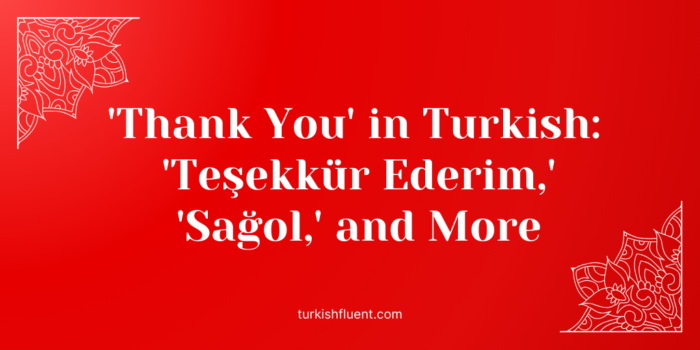Expressing gratitude is essential in any language. In Turkish, there are several ways to say “thank you,” depending on the context and level of formality. This article covers the most common phrases, their meanings, and how to use them correctly.
Table of Contents
1. Formal Ways to Say “Thank You”: Teşekkür etmek
In Turkish, “teşekkür” means “thanks” and comes from the Arabic word “şükr” (شكر), meaning gratitude. The verb “etmek” means “to do” or “to make.” So, when combined, “teşekkür etmek” literally means “to do thanks” or “to express thanks.”
The phrase “teşekkür ederim” is a full sentence that means “I thank you.” This phrase follows a common verb construction in Turkish, where etmek (to be; to make) is used to form verbs from nouns. The conjugation is as follows:
| Subject | Verb Form | Meaning |
|---|---|---|
| Ben (I) | Teşekkür ederim | I thank (you). |
| Sen (You) | Teşekkür edersin | You thank. |
| O (He/She/It) | Teşekkür eder | He/She/It thanks. |
| Biz (We) | Teşekkür ederiz | We thank. |
| Siz (You – formal/plural) | Teşekkür edersiniz | You (plural/formal) thank. |
| Onlar (They) | Teşekkür ederler | They thank. |
Note that we mostly use the first singular person (teşekkür ederim) or the first plural person (teşekkür ederiz).
Examples:
- Sana teşekkür ederim. (I thank you.)
- Biz öğretmenimize teşekkür ederiz. (We thank our teacher.)
- Beni dinlediğiniz için teşekkür ederim. (Thank you for listening to me.)
Difference Between Teşekkür Ederim and Teşekkürler
The word “teşekkürler” is the plural form of “teşekkür”, meaning “thanks” (literally “thanks” in a general sense). Unlike “teşekkür ederim”, it does not include a verb and functions as a standalone phrase.
| Phrase | Meaning | Usage |
|---|---|---|
| Teşekkür ederim | I thank you. | More formal, polite, and complete. |
| Teşekkürler | Thanks. | Shorter, slightly less formal. |
Examples:
- Teşekkür ederim, yardımınız için. (I thank you for your help.) → More polite and formal.
- Teşekkürler, çok naziksiniz. (Thanks, you are very kind.) → More casual and direct.
If you’re speaking to elders, in a business setting, or in a polite conversation, “teşekkür ederim” is preferable. If you’re in a casual chat or texting a friend, “teşekkürler” works just fine.
2. Other Ways to Say “Thank You”: Sağ ol
Here are three common ways to say “thank you” other than “teşekkür ederim” in Turkish:
| Turkish Phrase | Meaning | Usage Context |
|---|---|---|
| Sağ ol | Thanks | Common among friends and family. |
| Eyvallah | Thanks / Alright | Used mainly by men in casual but more traditional settings. |
| Allah razı olsun | May God bless you | Religious and used in heartfelt gratitude. |
Examples:
- Sağ ol, bana kahve getirdiğin için. (Thanks for bringing me coffee.)
- Eyvallah dostum, çok iyisin. (Thanks, my friend, you’re great.)
- Bana yardım ettiğin için Allah razı olsun. (May God bless you for helping me.)
How to Use “Sağ Ol”
In casual conversations, Turkish speakers often use shorter and more relaxed expressions of gratitude. One of the most common informal ways to say “thank you” is “Sağ ol.”
The phrase “sağ ol” comes from two words:
- “Sağ” → meaning “alive,” “healthy,” or “well.”
- “Ol” → meaning “be” (imperative form of the verb “olmak,” which means “to be”).
So, “sağ ol” literally means “Be well” or “Stay healthy.” It is a way of wishing good health to the other person while expressing gratitude.
- It is informal and used among friends, family, and peers. It is never used in formal situations, such as with elders, teachers, or in professional settings.
- The phrase can be made more polite by saying “Sağ olun”, which is the plural or respectful form.
Examples:
- Sağ ol, bana kitap verdiğin için. (Thanks for giving me the book.)
- Sağ olun, çok yardımcı oldunuz. (Thank you, you were very helpful.)
- Arkadaşım, sağ ol her şey için! (My friend, thanks for everything!)
Although “sağ ol” is a form of gratitude, it also carries a sense of well-wishing, making it unique compared to standard phrases like “teşekkür ederim.”
3. How to Respond to “Thank You” in Turkish
When someone thanks you in Turkish, you can reply in several ways:
| Turkish Phrase | Meaning | Usage Context |
|---|---|---|
| Rica ederim | You’re welcome | The most common and polite response. |
| Bir şey değil | It’s nothing | A casual response. |
| Ne demek | Don’t mention it | Used with friends or in relaxed situations. |
| Her zaman | Anytime | When offering ongoing help. |
Example Sentences:
- Teşekkür ederim. → Rica ederim. (Thank you.) → (You’re welcome.)
- Sağ ol. → Bir şey değil. (Thanks.) → (It’s nothing.)
- Yardım için çok teşekkür ederim. → Her zaman. (Thank you for helping.) → (Anytime.)
